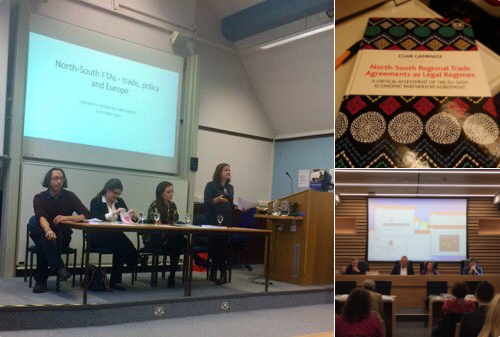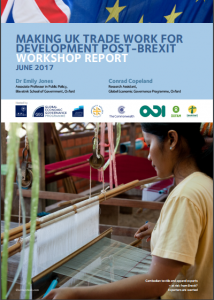At the University of Bristol Law School, we are investigating the dynamics of negotiation, implementation, and enforcement of North-South trade agreements.
 The following is a record of the findings of the panels speaking at an event held on 4 October 2017. The first panel (Clair Gammage, Maria Garcia and Tonia Novitz, chaired by Phil Syrpis) examined the external policies of the European Union (EU) particularly in the context of regionalism and free trade agreements (FTAs). The second panel (Emily Jones, Sophie Hardefeldt and Gabriel Siles-Brügge, chaired by Tonia Novitz) examined how the UK could – in the event of Brexit – depart from or improve on the practices of the EU.
The following is a record of the findings of the panels speaking at an event held on 4 October 2017. The first panel (Clair Gammage, Maria Garcia and Tonia Novitz, chaired by Phil Syrpis) examined the external policies of the European Union (EU) particularly in the context of regionalism and free trade agreements (FTAs). The second panel (Emily Jones, Sophie Hardefeldt and Gabriel Siles-Brügge, chaired by Tonia Novitz) examined how the UK could – in the event of Brexit – depart from or improve on the practices of the EU.
EU policy relating to North-South trade agreements
Clair Gammage (Bristol) discussed the transformation of the EU’s relationship with its trade partners across the African, Caribbean, and Pacific regions and was able to point to the surprising small victories that low-income countries in the Global South had achieved when negotiating trade agreements with the EU.
Interrogating the legal framework of the World Trade Organisation (WTO), which establishes the rules relating to the creation of a free trade agreement, Clair illustrated how the scope for negotiation of ‘regional spaces’ created by Article XXIV of the GATT and the formalisation of what constitutes a region has allowed inter-regional sites for contestation and mimetic challenge. In this way, a legal framework has inadvertently offered a space for deliberation and participation of both state and non-state actors in shaping the creation of new inter-regional agreements.
The importance of EU policy coherence, not least between the Commission’s Directorate Generals, such as DG TRADE and DG DEVCO, is key to successfully embedding concepts such as equality, justice, and rights in trade agreements between the EU and other countries
Maria Garcia (Bath) offered an analysis of the significance of trade agreements with South-American states, in the context of geo-economic competition with the US.
She noted that the EU’s insistence on sustainability chapters has the opportunity to create dialogue and socialisation processes, whilst respecting each party’s customs and right to regulate.
The Latin America FTAs have shown shortcomings with the model (lack of funds, lack of autonomy), which have spurred an intense debate and reflection period in the EU around these chapters, which should lead to sustainability chapters 2.0, possibly with additional areas.
An EU Horizon 2020 Project, ‘Sustainable Market Actors for Responsible Trade’ (SMART), was the subject of the presentation by Tonia Novitz (Bristol). She and Dr Gammage are leading on the ‘Trade and Investment’ section of the project, having drawn on the expertise of the SMART project participants which spans 25 research institutions and more than 50 researchers across the world.
The preliminary findings of the project are that:
- the apparently discrete legal regimes regarding trade, corporate governance, investment and finance interact in ways that require further attention, such that the impact of mega-regional agreements on other legal and political commitments must always be carefully considered;
- access to justice is problematic for low-income states both in WTO dispute settlement and investment arbitration, which could be addressed through reconsidering rules for standing and issues of funding;
- the diversity of public, private and hybrid actors and differentials in their capacity to influence negotiations and implementation of agreements requires more regulatory attention; and
- transparency is vital but will not deliver accountability.
Beyond EU policy – post-Brexit
In the second panel, Emily Jones (Oxford) offered a vision of Brexit as an opportunity for better trade relations.
Her recent work has been concerned with Making Trade Work for Development Post-Brexit and she identified a number of risks regarding Brexit. The first and foremost of these is trade disruption, which could lead to problems with preferential access and higher tariffs, although she noted that the UK government is working to address these.
Non-tariff barriers could also arise and costs could emerge from divergent regulations. There could also be significant disruption to EU/UK supply chains, which contain components from developing countries.
If the UK wants to present itself as an ethical trade actor, then it can build from and improve upon EU trade policy. To ensure development concerns are prioritised in trade agreements, the UK could go further than the EU and give the Department for International Development (DFID) a substantial role in the negotiations (compare with DG TRADE and DG DEVCO above).
Sophie Hardefeldt (Trade Justice Movement – TJM) is more concerned with the immediate plans for two Trade Bills following on from Brexit and how vital it is for there to be sufficient scrutiny of their content and the creation of a democratic procedure for the adoption of FTAs.
Trade has an enormous impact on the UK economy and society and there are insufficient constitutional safeguards at present, where international agreements tend to be seen as a matter of sovereign prerogative, when they should be the subject of democratic and participatory debate.
Gabriel Siles-Brügge (Warwick and a Parliamentary Academic Fellow) was here expressing his own independent views. Reiterating the need for transparency in trade negotiations, he noted the importance of parliamentary scrutiny in EU trade policy. He stressed that the experience of the European Parliament in EU trade policy suggested that legislatures provided a fruitful avenue for NGOs to raise such issues during the negotiations.
The EU requirement for negotiators to report to and seek legislative approval for trade and investment agreements should be replicated in UK parliamentary processes, which should also give parliament the opportunity to have a say early on a pre-negotiation mandate.
As Professor Phil Syrpis noted in the discussion, transparency and a parliamentary vote may not necessarily secure legislative scrutiny as the outcome of the Gina Miller litigation has demonstrated. However, all participants agreed that the opportunity for political engagement and participation remains vital, as does the endeavour to include not only procedural but substantive human rights, environmental, labour and other standards associated with sustainability into the UK trade regime.
This event report was written by Professor Tonia Novitz, University of Bristol Law School.
The event was part funded through the PolicyBristol Support Scheme.

